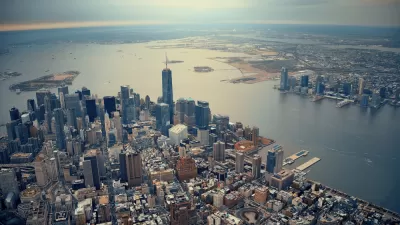Silos and smokestacks are the way of the past for rural area development, according to economist Mark Drabenstott who offers a new idea for bringing economic activity to rural places.
In this article for The Daily Yonder, Drabenstott argues that small rural towns have for too long competed with each other to lure new jobs. He says they should start to take a regional approach and work together.
"The rural Midwest could have an economic future as bright as its vibrant past. But it is basing its twenty-first-century future on a twentieth-century playbook. This is not a recipe for success. Towns and counties compete with neighboring towns and counties for jobs and investments. Industrial recruitment-"smokestack chasing"-is the norm. Economic development agencies spend millions on infrastructure and tax breaks to lure companies from afar instead of creating new jobs at home. Boosters sell the rural Midwest as a cheap place to make things, ignoring the region's many other economic assets-its natural resources, its hard-working people, its central location, its schools and universities, and its scientific base, among others -that could all be leveraged into a competitive new economy.
The path to stronger economies in the rural Midwest is plain. Partnering regionally to compete globally is what's needed. This pathway will lead to scores of multicounty, self-defined regions across the Midwest. Only by combining their forces to create new businesses and good jobs at home will the towns and counties of the rural Midwest compete and thrive in a global economy where this sort of collaboration is fast becoming the norm."
FULL STORY: Past Silos and Smokestacks: A Rural Development Proposal

Americans May Be Stuck — But Why?
Americans are moving a lot less than they once did, and that is a problem. While Yoni Applebaum, in his highly-publicized article Stuck, gets the reasons badly wrong, it's still important to ask: why are we moving so much less than before?

Study: Maui’s Plan to Convert Vacation Rentals to Long-Term Housing Could Cause Nearly $1 Billion Economic Loss
The plan would reduce visitor accommodation by 25,% resulting in 1,900 jobs lost.

Using Old Oil and Gas Wells for Green Energy Storage
Penn State researchers have found that repurposing abandoned oil and gas wells for geothermal-assisted compressed-air energy storage can boost efficiency, reduce environmental risks, and support clean energy and job transitions.

San Diego Swaps Parking Lane for Kid-Friendly Mini Park
The block-long greenway will feature interactive play equipment and landscaping.

Tracking the Invisible: Methane Leaks From LA’s Neighborhood Oil Sites
Environmental advocates are using infrared technology to monitor and document methane leaks from neighborhood oil sites, filling regulatory gaps and pushing for stronger protections to safeguard community health and the climate.

Montana Bill Promotes Parking Reform
A bill before the Montana state senate would bar cities from requiring more than one parking spot per new housing unit.
Urban Design for Planners 1: Software Tools
This six-course series explores essential urban design concepts using open source software and equips planners with the tools they need to participate fully in the urban design process.
Planning for Universal Design
Learn the tools for implementing Universal Design in planning regulations.
Caltrans
Heyer Gruel & Associates PA
Institute for Housing and Urban Development Studies (IHS)
City of Grandview
Harvard GSD Executive Education
Salt Lake City
NYU Wagner Graduate School of Public Service
City of Cambridge, Maryland



























